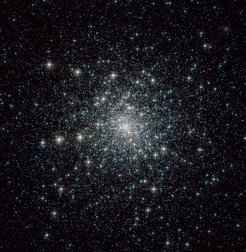RAS Group Award 2023 goes to MeerKAT
The MeerKAT radio telescope in South Africa receives prestigious award of the Royal Astronomical Society
The MeerKAT team is awarded the Group Award of the Royal Astronomical Society for a series of spectacular observations in radio astronomy, the highlight being the images of the Galactic Centre region and the spectacular radio bubbles. In addition, the MeerKAT team have supported the development of science and technology in Africa and stress-tested technology for the Square Kilometre Array.
The Max Planck Institute for Radio Astronomy (MPIfR) and the Max-Planck-Gesellschaft in Germany, are involved in the MeerKAT project by providing a set of receivers in the S-Band frequency range for each of the dishes and also by an extension project increasing the total number of MeerKAT dishes from 64 to 84, thus increasing sensitivity, spatial resolution and image quality of the telescope.
Coincidentally, a new science result based on MeerKAT observations led by MPIfR scientists is published on the same day which has solved a 20-year old mystery: pulsar observations of the globular cluster M30 led to the re-detection of a long-time missing millisecond pulsar in a highly eccentric binary orbit. The findings are published today in The Astrophysical Journal Letters (ApJL).

After more than a decade of development and operations, the MeerKAT team have, in a short time, achieved spectacular advances in radio astronomy. Amongst many breakthrough observations, the MeerKAT images of the Galactic Centre region revealed for the first time the amazing large-scale radio bubbles around Sgr A* and the evidence of a common origin for these bubbles. MeerKAT also tracked the radio afterglow of the first ever observed neutron star merger event and revealed powerful ejections from a stellar-mass black hole and contributed to the detection of the first afterglow from a gamma-ray burst detected by ground-based Cherenkov telescopes. As well as the extensive scientific output, MeerKAT has supported an intensive programme of human capital development in Africa, stress-tested the technology for the Square Kilometre Array and helped train the next generation of radio astronomers. For these reasons the MeerKAT team are awarded the 2023 Group Achievement Award (A) of the RAS.
The Max Planck Institute for Radio Astronomy (MPIfR) in Bonn, Germany, is participating in the MeerKAT project in a two-fold manner. It provides a set of receivers in the S-Band frequency range for all the dishes of MeerKAT. Moreover, the MeerKAT Extension Project (MK+) will provide a considerable improvement to MeerKAT, presently consisting of 64 radio dishes forming an array telescope of up to 8 km virtual diameter. MK+ will increase the total number of dishes to 84 and will also increase the maximum distance between the antennas to 17 km, thus enabling an increase in sensitivity, spatial resolution and image quality. The extension will be jointly funded by the South African Radio Astronomy Observatory (SARAO) and the Max-Planck-Gesellschaft (MPG) in Germany. “The scientific perspective with survey programs of the Southern Sky in the MeerKAT frequency range will provide legacy value and enable the study of transient sources like fast radio bursts or Pulsars, cosmology and large-scale structures, individual galaxies and also sources within the Milky Way”, states Michael Kramer, Director at MPIfR and head of its “Fundamental Physics in Radio Astronomy” research department.
In parallel to the announcement of the RAS group award for the MeerKAT team, a new scientific result based on MeerKAT observations is published today in the “Astrophysical Journal Letters”. An international research team led by Vishnu Balakrishnan from MPIfR re-detected a long-time missing binary millisecond pulsar in Messier 30 (M30), a globular cluster in the Capricornus constellation. PSR J2140−2311B (or M30B) is a 13-ms pulsar originally discovered in 2001 and predicted to be in a highly eccentric binary orbit. This pulsar has eluded detection since then, therefore its precise orbital parameters have remained a mystery until now.
New MeerKAT observations of M30 within the TRAPUM Large Survey Project now confirmed the pulsar. The observations have enabled the determination of a highly eccentric orbit with a period of 6.2 days. The total mass of the system was estimated to approx. 2.5 solar masses, consistent with the lightest double neutron star systems known. “The massive, undetected companion could either be a massive white dwarf or a neutron star. M30B likely formed as a result of a secondary exchange encounter. Future timing observations will allow us the determination of a phase coherent timing solution, enabling the detection of additional relativistic effects which will determine the mass of the pulsar and its companion”, concludes Vishnu Balakrishnan.

-------------------------------------------------------------------
Background Information
The Royal Astronomical Society (RAS), founded in 1820, encourages and promotes the study of astronomy, solar-system science, geophysics and closely related branches of science.
Operated by the South African Radio Astronomy Observatory (SARAO), MeerKAT is the largest radio telescope in the Southern hemisphere and one of two precursor instruments of the SKA Project based in South Africa. Located in the Karoo desert, the radio telescope will soon be expanded with an additional number of dishes, becoming “MeerKAT+”. This will later be gradually integrated into SKAO's Mid telescope, whose construction has already begun and will continue until 2028. The first scientific observations of MeerKAT+ could begin as early as 2023, during the testing phases of the telescope.
TRAPUM (TRAnsients and PUlsars with MeerKAT) is one of the Large Survey Proposals running on MeerKAT and is an international collaboration, led by the University of Manchester and the MPIfR, and includes institutions such as INAF, the National Radio Astronomy Observatory (NRAO) and the South African Radio Astronomy Observatory (SARAO).
The research team for the M30B paper consists of Vishnu Balakrishnan, Paulo C. C. Freire, Scott M. Ransom, Alessandro Ridolfi, Ewan D. Barr, Weiwei Chen, Vivek Venkatraman Krishnan, David Champion, Michael Kramer, Tasha Gautam, Prajwal Padmanabh, Yunpeng Men, Federico Abbate, Benjamin W. Stappers, Ingrid Stairs, Evan Keane, and Andrea Possenti. Eleven of the authors (Balakrishnan, Freire, Barr, Chen, Krishnan, Champion, Kramer, Gautam, Padmanabh, Men, Abbate) are affiliated with the MPIfR.

